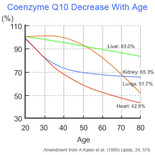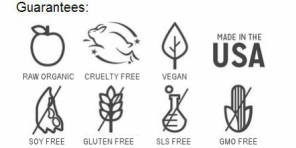 CoQ10 (Coenzyme Q10), also called Vitamin Q, is a naturally occurring enzyme found in every cell of the body. Ubiquinone, an alternate name for CoQ10, is from ubiquitous, meaning "found everywhere". CoQ10 plays a key role in producing energy in the part of a cell responsible for the production of high energy for the fuel responsible for muscle contraction. In fact, it is found in every single mitochondrial cell – and about 95% of your body’s energy is reportedly produced by these cells. It is essential to good health, and plays a particularly important role in radiant, youthful-looking skin. It is a powerful antioxidant, neutralizing free radicals in your body and helping to prevent their damaging effects on your skin. Your body produces this vital nutrient, however, as you age, your body's production of CoQ10 begins to gradual decline after the age of 20, inciting the aging process of the skin. By increasing this important enzyme, topical applications of CoQ10 have been shown to reduce the signs of aging skin. Lowered levels of CoQ10 tend to cause a diminished production of collagen, elastin and other important skin molecules, and skin may also be more susceptible to free radical damage. Topical applications of CoQ10 boosts skin regeneration and repair, while aiding free radical damage caused by exposure sun, pollution and smoking. An added benefit is CoQ10's relatively small molecular size, making it easily absorbed by the skin. Valid scientific studies supporting the effects of CoQ10 indicate that CoQ10 has the effectiveness to prevent many of the detrimental effects of photo-aging (the skin damage and premature aging resulting from sun damage to the skin). (1) Another study indicates CoQ10's ability to decrease 'crow's feet' around the eyes with long-term application. (2) Whether in your 20s or your 80s, there is an overwhelmingly vast amount of scientific research that points to CoQ10 having a substantial impact on your health. Our products are formulated with consciousness using the cleanest, safest, purest ingredients, without pore-clogging mineral oil, petrolatum or propylene glycol, exceeding FDA standards and EU Directive standards for safe cosmetics. They are also free of parabens, artificial colors and synthetic fragrances, so you can be sure that no harmful ingredients will be absorbed into the body through your skin. Check out our Special K Bouquet - ANTI-AGING CREAM with CoQ10. References 1) Coenzyme Q10, a cutaneous antioxidant and energizer 2) Modulation of oxidative stresses in human aging skin
3 Comments
 Quality skin care is a process of feeding our body and our skin the superior nutrients needed over time and keeping the toxin levels within the body as low as possible. When you use high quality, natural organic products, all the ingredients are active. They’re all beneficial and they all feed the skin. Exactly what is a natural active? First we must define natural. ‘Natural’ skin care is not always natural. There are two definitions of the word natural. The dictionary defines it as: “Existing in or, formed by, nature”. We adhere to the dictionary definition to determine the ingredients we use in our products and only use ingredients existing in or, formed by, nature. Unfortunately, many manufacturers in the cosmetic industry have strayed from that definition and consider natural to be: “Any ingredient derived from a natural substance”. Manufacturers commonly use the word ‘natural’ on labels, when the products are full of synthetic ingredients. We’re not saying that all synthetic ingredients are bad for you. In fact, there are natural ingredients, which may harm you as well. Poison ivy is natural, but would you want to put it on your skin?? Of course not. We place an emphasis on natural and organic ingredients that have a history of being good for your skin. Why use synthetics when natural and organic ingredients are truly effective? Consider coconut oil. For example, Cocamide-DEA is “derived from” coconut oil”. It may well be from coconut oil, but a synthetic chemical called diethanolamine is used in the extraction process. It is known to cause cancer. An ingredient is not really natural if it has been processed in this way. However, extra virgin coconut oil is a wonderful and truly natural ingredient pressed from fresh coconut meat (not dried copra like commercial grade coconut oil, which is not edible until refined). Other ingredients like CoQ10 or B12 are truly natural and can be also be used, because they are created through a natural fermentation process. Now that we understand what ‘natural’ means, we need to define ‘actives’. Active ingredients are those ingredients in nature that react with your skin to produce a positive effect. Ingredients that come directly from or exist in nature have more nutrients, vitamins, antioxidants and other beneficial properties – and are, therefore, more ‘active’. You find them in whole plant (and some animal) ingredients or plant extracted ingredients (such as herbs, essential oils, herbal tinctures/extracts, hydrosols, plant waxes, and unrefined carrier oils) . . . and they’re edible! Take a look at our Ingredient List to read detailed descriptions of the natural actives we use in our skin care products. |
Contact UsAuthorWelcome! I'm Stephanie (Jo to close friends), founder of EdenSong. Aside from my university studies, I have a natural passion for all things organic. I enjoy living and learning about natural ways, all things health related, cooking, gardening with herbs and flowers, photography, DIYing, yoga, bicycling, ballet, traveling and being with family and friends. A quirk of mine is my near obsession of Asian culture, particularly Korean history and its language. Would you like to know more? Find out about us. Categories
All
Archives
December 2014
© EdenSong Essentials
All Rights Reserved |
|
Sign up for monthly free tips and recipes.
|
Shop About Us Contact Us Ingredients Endorsements Terms & Policies Get in Touch Customer service or wholesale inquiries, please leave us a message: 615.292.1000 Or better yet, email us: [email protected] |
Connect Socially
© EdenSong Essentials
All Rights Reserved |




